Talen Talks Netflix Marvel
There, are at this point, six major Marvel Netflix TV series, and I have watched all but one of them. Starting in 2015, the Marvel Netflix experiment was seen, for a time, as a reason to get Netflix, and gave us a sequence of shows that were, in their own ways, pretty impressive. If you were a critic who wasn’t me, you’d talk about how they elevated a different kind of superhero, how they showed a different dimension of superheroics and were a step apart from the brightly coloured optimism and simplicity of the movies.
I don’t tend to agree with other critics, I find.
Anyway, I did watch exactly the right amount of all of these series and wrote about them, but found to my amazement going back, that if you want to look at those articles there’s really no single source. I watched them in orders close to release order, all higgledy-piggledy. Heck, my articles about it predate the Story Pile terminology I use on this blog to sort that kind of article.
With that in mind, what I’ve done here is a masterpost, bringing these six series together, so you can read them all conveniently.
Story Pile: Iron Fist, Season 2 – Danny
Joking aside, the fact is, I think Iron Fist Season 2 deserves some consideration as an object lesson for writers. It’s a series that has a structural problem – something is wrong in the way that the series is made, there’s a brokenness in it, and that break means that everything that connects to it is itself, in some way, sharing in that brokenness.
Spoilers, in a broad sense. I’ll tell you some of the plot points, but not in any kind of specific way.
The problem with Iron Fist, Season 2, is that Danny sucks.
Story Pile: Iron Fist, Season 2 – Mary
Let’s get the bookkeeping out of the way. Here’s your spoiler warning, I discuss a character and their backstory and if you somehow wanted to go into Iron Fist for the surprise, then you want to skip out now. Mild content warning for mentioning traumagenic mental health issues.
Iron Fist has been cancelled, but I don’t really believe that. I think it’s much more likely that these shows have been shut down for a point of soft continuity with Netflix and Disney’s upcoming streaming service. There might not be any more of this Iron Fist but there almost certainly could be more if Disney decide it’s worth their return on investment.
The question that keeps coming up is why do this?
One might wonder why I feel the need, after consideration, to turn to the second Iron Fist season and engage with it critically. After all, the series has been cancelled; there will be no more of it. It’s gone, I’ve won. Right? That’s what critics do, they engage with media purely as part of a way of exerting their power on the object. Stop, stop, I won, it’s already dead! And what if someone out there really liked it? By criticising a thing they liked, am I not hurting them, am I not reflecting upon them and maybe making them feel bad, because my opinions and theirs disagree?
And here, I want to offer you comfort. Even if it was somehow meanspirited to kick this series while it was down, it is a multi-milion dollar project and everyone involved is doing fine. If you, personally, feel attacked by my talking about this series being bad, please, don’t read this article and go elsewhere. Live your life.
I want to talk about Iron Fist Season 2 because I like stories, I like this kind of story, and I want to talk about ways to do this kind of thing well. That means, when the time comes, recognising when something bad does something right. With that in mind, I want to talk about the best thing in Iron Fist, Season 2.
Iron Fist Cancellation
I was planning on doing a Story Pile about Iron Fist season 2, talking about the problems it has, the reasons it doesn’t work, the reasons I hate it (Danny sucks) and all that.
Then I got the news, today, just out of the blue, after one week of being live on Netflix, that Season 3 of Iron Fist has been cancelled.
I don’t know how to feel about this in its entirety. Like, I was unhappy with the series, but it was a hate that came with a want for a good version of the thing. I wanted an Iron Fist series that was good. When Iron Fist season 1 was bad, I wanted the badness to inform season 2, and when season 2, I had it in me to hope that season 3 could be good, or at least interesting as a failure instead of the black hole of suck that season 2 wound up being.
And then, today, the abrupt news that Marvel and Netflix have decided to just kill Iron Fist season 3.
I mean, it wasn’t going to be good. The people who made Season 1 made a bad thing and the people who made Season 2 with fewer excuses for it being bad. Now I’m wondering if it’d be worth my time to even commentate on the series as a media object itself, or if it’s more of a closed circle. Is there a meaningful autopsy there? Is there a sincere, reasonable purpose to dismantling the terribleness of Iron Fist season 2? Would it be interesting, or edifying?
I’m not sure.
But it is pretty weird to sit back, watch a show on Netflix, say ‘this is garbage’ and then have the voice from on high agree with me.
Iron Fist Week Part 5: Knowing Yourself
Iron Fist, the 2017 Netflix series, is bad.
Let us, for now, set aside its issues as an adaptation of a source material.
Let us set aside its issues with racial contexts.
Let us set aside the choices it makes heedless of women and culture.
Let us set aside its poor editing and the practical work of cinematography.
Iron Fist is bad because more than anything else, it’s a series that doesn’t know what it is about.
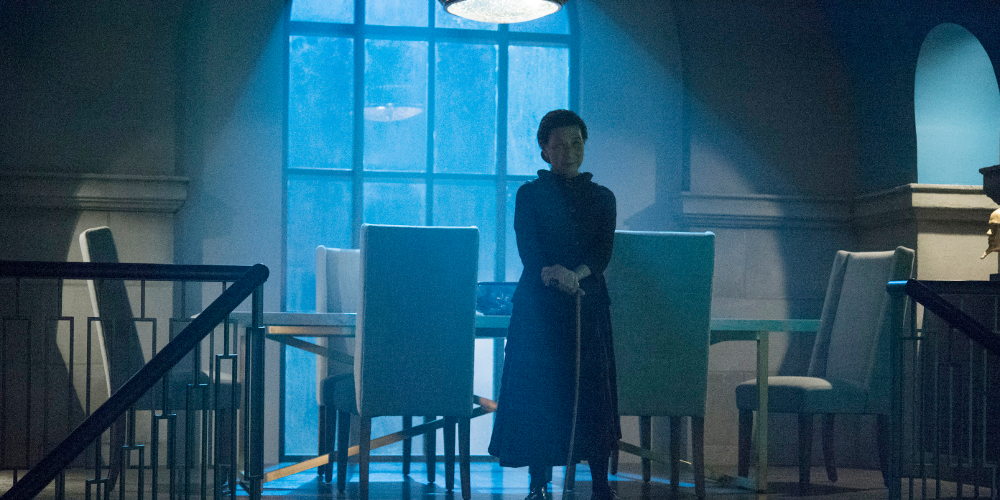
I’ve touched on this in these articles. The fear of the costume and the style of the superhero. The way they hired someone who wasn’t good for the role in any way. The excuses, the endless excuses for why the show isn’t very good, the defensive posture that blames their failings on, amongst other things, a presidential election. The way the took a story about a martial artist returning home to right a dreadful wrong through violence against an old disabled man, and made it about conspiracy and zombies and another hero’s villains. Every single one of these decisions is a bad one and none of them are bad enough to stand on their own as a sign of what made the series break, none of them are this series’ fatal flaw.
But every single one of them could only show up if you, when presented with the series as it exists, had no idea what it was meant to be. The show doesn’t know why it missed or what it missed, because the show didn’t know what it was trying to even be in the first place. Say what you want about Luke Cage’s position on Blackness, it at least knew damn well it was a series about a Black superhero dealing with Black Street problems. The identity of Luke Cage permeates its very being.
Let us then speak of what I feel represents the central coda, the most important and vital flaw of the Iron Fist series and the way it handles its central premise, the characteristic that the series is literally named for.
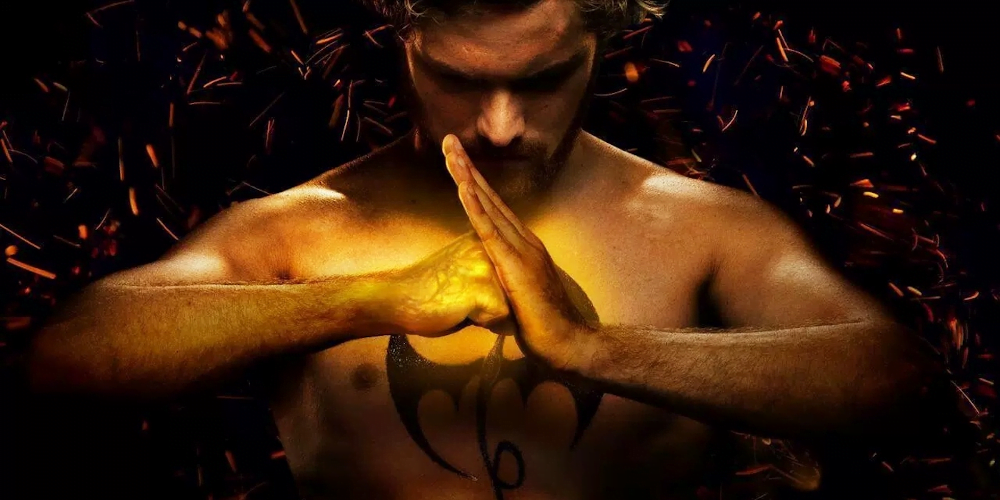
What is the Iron Fist?
It is the power that Danny has, which the story… sort of doesn’t really explain. It’s just, he has the power of the Iron Fist, and he mostly uses it to punch through walls. It’s not used creatively or cleverly. It is power, a direct application of force, and Danny can’t use it constantly. There is no explanation as to why. At one point he heals Coleen, and then that’s it. The Fist is returned to being vaguely explained. Defenders elaborates on it, but it still is building on the foundations of Iron Fist, inheriting its flaws.
Some comics fans may be seething, shouting at their screens about how the comics handle it and yes, the comics handle it better and you are right, but that is not important. This is not a point of comparison, this is looking at the series and its own message.
When and how does the character use the power? What limits it? What provokes it? What, in this superheroic story, is the thing that sets the character apart from the greater population, and how do they access this power? What, more than anything else, is the Iron Fist about?
I’ve watched this series now, I’ve double checked, and the single common trait with Danny using the Iron Fist is Danny getting mad.
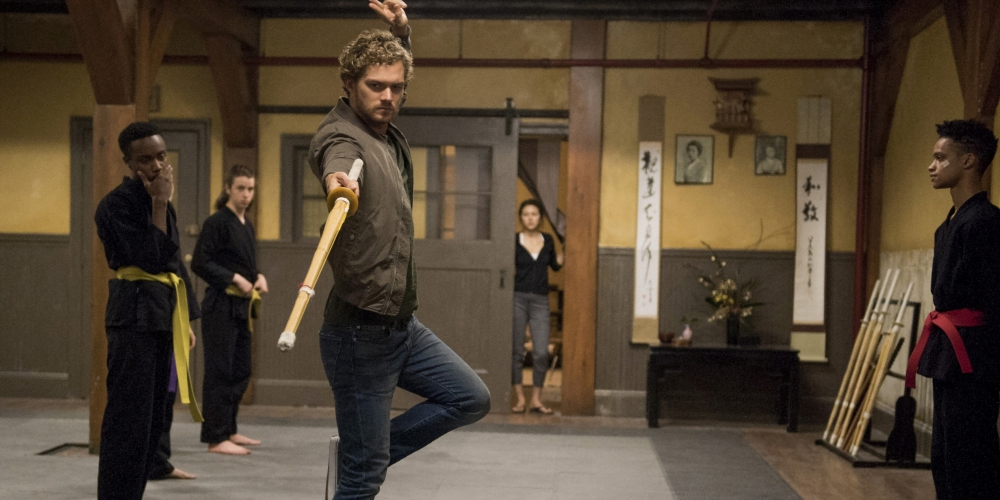
Danny gets angry, and the power comes to him. When the power is not available, it is because he has not gotten mad enough. There is no philosophy, no coda, not even the most rudimentary of koan. The story doesn’t frame the Iron Fist’s power as a result of study, or training, or an emotional centering, or being able to spend his time fighting or charging up or needing to summon the megazords or anything. It connects very directly. Anger In, Power Out.
That is the story this show thinks is interesting. That’s the central idea of this series. Danny needs to find things that make him angry enough to act, angry enough to draw on that power. That’s your story. It permeates. Danny is mad that he is being denied his billionaire status – not because he wants it, but because he’s being denied it. Danny has outbursts of anger, he hates his opponents, he steps to violence in his very first scene for no really good reason. Opposition to Danny deserves violence, because Danny uses violence, and violence is directly and only connected to anger.
This is this world’s Danny Rand. He is angry, not because of things he experienced, or internalised guilt. Not because of self-loathing or cruelty. I’d look at the subtext to work it out, but we don’t have to, because the story just flat-out tells you.
Danny doesn’t feel he has a place in the world, he feels like he doesn’t belong, like he needs something more in his life, a life that already features being an immortal god-fighting dragon-punching superhero billionaire. Danny was picked on a little bit as a kid, but he had loving parents who gave him everything, and even his father’s last words were that he loved him. Danny’s anger puts the loss of his family’s company on the same level as the loss of his parents at the same level as handcuffing him and so on, and it does not feel making his parents’ death an act he could be angry about is worthwhile.
There’s an attempt to represent his violence as like Coleen’s violence, as if the two share some emotional challenge, but it’s never explained because they don’t explain why Coleen is that way, because women don’t need backstories.
Danny’s anger is petulance at a void.
That’s not what the Iron Fist story really is about. That’s a stock character – it’s almost a cliche. Heck, it’s a Disney Princess at the most bland.
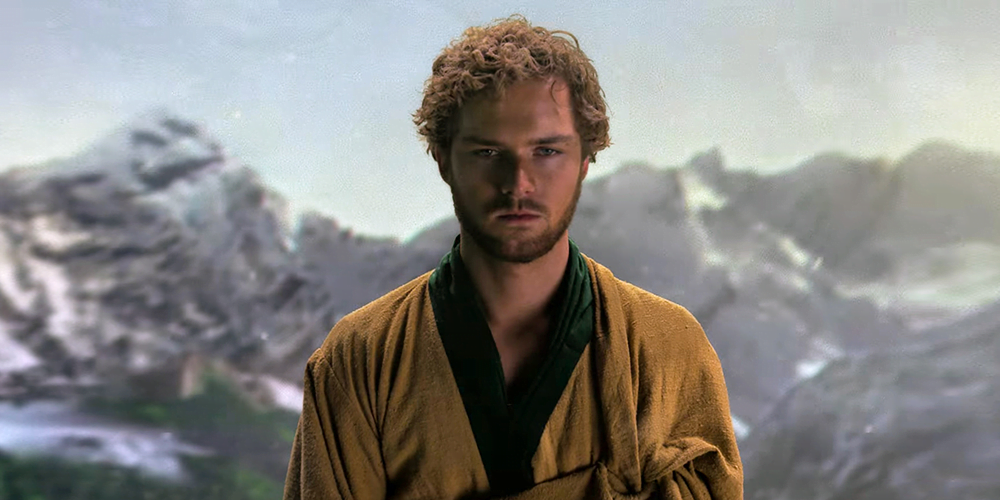
This, all of this, is what you get when your story doesn’t really know what it’s about. The people in the story talk about the trappings of kung fu – in a really orientalist way, of course – and about the idea of a business conspiracy or Rand enterprises or all these things, and there’s talk about centering Danny’s chi and connecting him to other stuff, but none of it connects, none of it really makes any sense because there’s no central throughline of the character, the idea of how you attain power, or how Danny relates to power and violence beyond get opposed, get angry, get power.
A final example, from the last episode.
In two scenes, back to back, Meachum forwards that he can do whatever he wants, because he has money. Cut. A different scene. Jill informs Danny that he can’t do whatever he wants, because he has money, meaning his actions will be observed. It literally uses the same funds to represent that Danny is unable to do things, and that Meachum can do anything.
This is a series that doesn’t know what it’s about, and doesn’t know what matters to it. What follows then is things cast down, to land near one another, in the shape of a narrative, ultimately hollow, ultimately meaningless.
There’s a sad irony here in that one of the most basic, well known pieces of actual historical philosophy quotes, a quote you can find on coffee mugs for executives, would help avoid this problem.
“If you know the enemy and know yourself, you need not fear the result of a hundred battles.”
— Sun Tzu’s, The Art of War
Surely even the kind of dinks who wrote this Danny Rand would know that one.
Iron Fist Week Part 4: Doing Poorly Poorly
Iron Fist is bad at doing all the things it wants to do.
We’ve talked in the process about things that will make your storytelling better. We’ve talked about looking at issues in structural ways, and we’ve talked about invigorating characters with character rather than as instruments for the story. We haven’t really dealt with specific, individualised incidents of hecking up execution. And this is a series that hecks up the execution a lot.
The Opening
Hey, remember this dark dynamic? This black arcing?
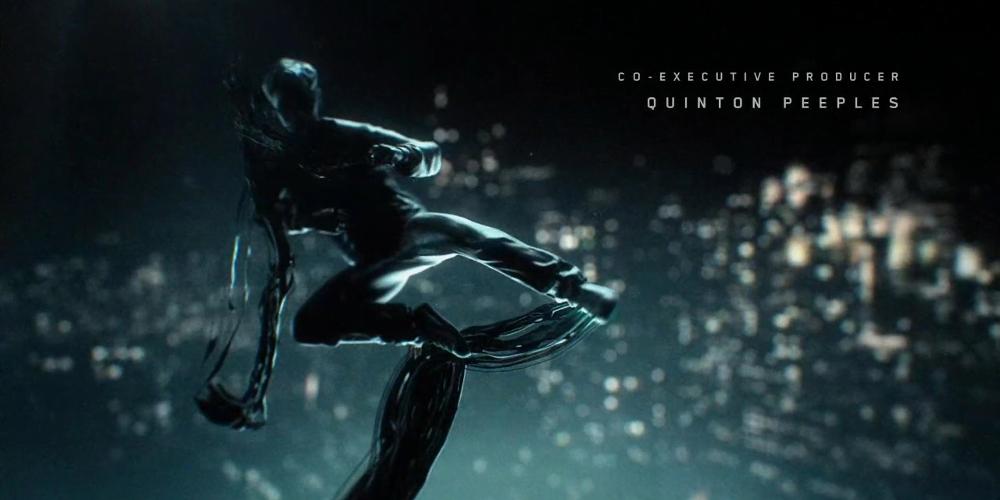
Why is this here?
Do you see this in the series at all? Does it tie into the colour dynamics of the rest of the series? Can you think of any time that the series does anything that looks like this? Danny has a clear colour dynamic of bright yellow, but dark black never really shows up to contrast with it like in this opening.
This is a visual motif that the show literally never uses except in its opening. In Daredevil, the colour scheme of the opening is a signifier; you see the red in Daredevil’s outfit, in Elektra’s outfit, in background colours and lighting and shots and it’s also a motif of the bloodstains and damage you see on Matt. Luke Cage uses yellow to indicate street signs, and imbalances (like yellow tinted windows, gold of crowns, the warm light of the club looking down on the patrons).
By contrast, Danny gets a yellow fist and that’s it. The Defenders builds on his colour scheme, of course, putting him in green light that helps to contrast him to Matt, while also suggesting a commonality in his space between Luke and Jessica, but in this opening, in this first impression, what is there of Danny that exists. What works?
Nothing.
Also, because this character is both animated and obscured, they can show that character doing a bunch of extremely cool things, as if he had, perhaps, mastered some martial arts, martial arts that let them do something like attain the powers of the Immortal Iron Fist. I hope you’re not attached to this sort of acrobatic motion with lines of energy like this, though, because you’re never going to see it.
The Chi Focus
If you go back and rewatch the first episodes like I did, because I dunno, I make bad life choices, you might remember there was this recurrent visual theme they tried to use for Danny to focus his chi. Lots of vertical lines, blurring and shifting over the film. Remember that? Danny’s inability to focus his chi is an early story beat that fades away, and with it, the effect. It’s not used later to represent when he’s out of focus with his chi despite the fact that his chi is out of whack is used as a story beat.
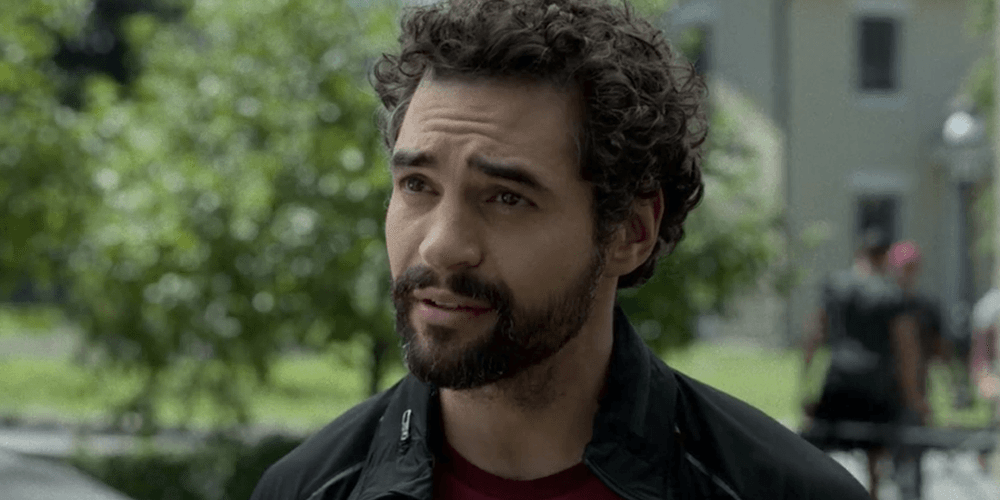
Remember? It was a whole thing? It was after Danny healed Coleen with Bakuto’s help and – oh, okay, Remember how Danny healed Coleen in the middle of the series? Remember that now he has the ability to do Amazing Healing Moves and he just… doesn’t do it again?
I bring this up because these are examples of rudimentary execution error. If you introduce a power in the second act of a story it should matter, in some way, by the end of the story. If you’re going to introduce a visual aesthetic to a problem, use that visual aesthetic again when you use that problem a second or third time.
In this, the healing is a doorway the story stepped through and forgot when they move on.
As a game, you can probably ask ‘remember when this happened’ about a lot of things in this series and watch people fail tell if you’re making it up or not, because there’s a lot of forgettable stuff here. There’s a reason we talk about repetition and patterns and structure in storytelling: These things make it easier – or possible – for the things you do to remain in people’s minds. It’s like telling a joke. You can’t just state a punchline – without a setup, it’s just a weird interjection pineapple.
Iron Fist’s central plot is mostly made up of about six or seven really short story beats, and the rest, because it is not anchored, it does not reside in the memory, is just… lost. It’s not just bad storytelling – it means much of this story is boring.
The Cu-Cu-Cu-Cu-Cu-Cuts And Edits
The fights in Iron Fist with one exception suck.
The excuse for this style of combat choppiness, with these super-short edits, is that it’s done to obscure the fact that half of the people in this scene can’t fight. Not in the style of the Iron Fist comics, not in the style of this series. Hell, not even in the style of Daredevil, the nearest approximate.
Now, this gets held up as an example of bad editing and I’d say it’s almost the opposite. The editor here clearly did a lot of work to try and turn pillowfist douchebeard into the person who was throwing punches. The editor can only work with what they’re given, and here, they’re given 56 individual components that they had to stitch together to fill 35 seconds. I give the benefit of the doubt, where I think this editor was using as much as they could of each shot, because editing is very hard.
With that, it means this bad scene’s fault falls on the person making decisions, and that means yeah, the director had to direct the fight coordinators and choreographers and camera people and the set managers. Some of these shots require cameras to be in places the characters physically are, meaning this was shot multiple times over.
There is nothing wrong with having Danny have a fight in this space, or even a fight with a bunch of cuts in it. But this way of doing it is bad, and has bad effects. It also gets to be easily held up as an example of a problem. It’s frantic and sloppy.
This is an example of an execution error, and not just stuff like the Line of Action that even a clueless donk like me knows about. I’m not a camera guy! I’m not a cinema guy! If I can look at this and say ‘whoah this is shit’ imagine what it’s like for editors and cinematographers and critics of that form! Imagine how it looks to them!
Oh and by the way, Finn, know what’s a great way to obscure when you change a shot from stunt double to lead actor?
A mask.
Like the Iron Fist wears.
Like he’s meant to wear.
LIKE A SUPERHERO SHOW WOULD USE.
Part 5: Knowing Yourself
Iron Fist Week Part 3: Fantasy That Mocks Reality
Let’s talk about choices.
There are some writers out there, and yes, I might mean you (and if I do mean you, I am judging you), who regard the story that they are writing as a wild creature that wanders and runs as it goes, and you, the author, are helpless to do anything but document it as the tiger whose tail they hold goes where it will. Which is to say, these people will blame the story for the choices they make about what to put in it. Which is to say, these people are cowards who don’t want to own up to the things they want to put in their story, the things they choose to do.
Choices like, for example, punching a woman in the face for no good reason, and treating an entire school of Asian martial philosophy like it’s a cereal box top. These are problems you can fix, if you acknowledge they are things you are choosing to do, and if you think about what you’re doing; they’re much harder to deal with if you pretend they sort of just magically slithered into the story themselves.
Does K’un-L’un Exist?
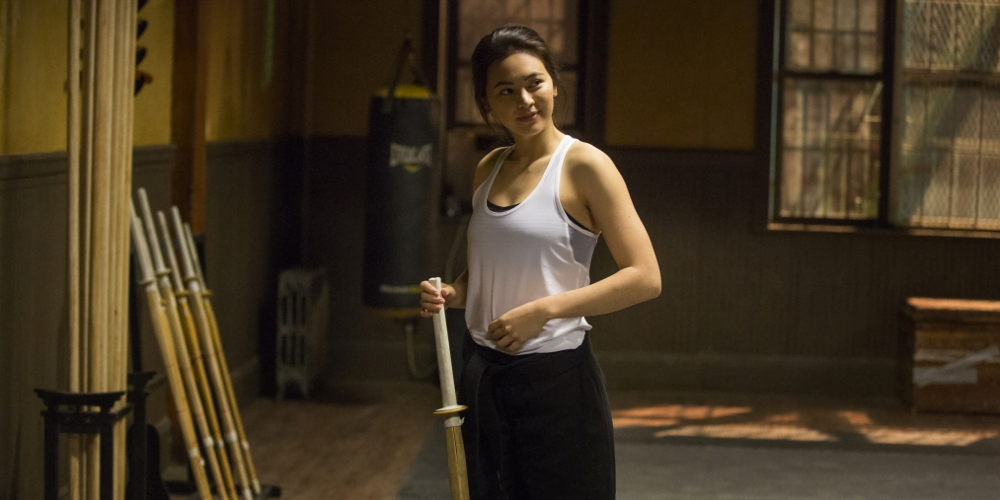
In Iron Fist Danny and Coleen talk about the philosophies of their martial studies. It’s a conversation that we see in small, clipped ways. He uses her sword in a way that’s kind of insulting, and the pair spar back and forth about the ideology of their worldviews. She cites this, he cites that. He demonstrates his superiority over her with physical force, imposition of his hand and body, while they discuss, her ideas being presented as tested against the ideas of his way, his way that seems to be winning all the encounters. Her ancient philosophy she learned from her family vs his ancient philosophy he learned from K’un-L’un.
Here’s the problem: K’un-L’un doesn’t exist.
The philosophies of Japanese martial arts are real things with real histories. Danny is talking made up D&D sourcebook bullshit, which is patched together with that special kind of ‘I just heard of this’ problem, things like travelling to a dojo to meet with a sensei to gain their respect as if that’s a practice everyone should know about despite it being a trend from one very specific period of Japanese history. Things like his disdain of shoes, his (unconsciously?) racist language when talking to the students, these are all covered under the heading of being ‘like K’un-L’un.’ Danny acts this way, and it is forgiveable in how it makes the character look in a world that is like our own, because Danny is from K’un-L’un.
But the problem is, again, that K’un-L’un doesn’t exist.
This is a worldbuilding point, this is about making the things you create in a universe feel like they matter, and showing them in contrast to things we know matter. It’s why heroes punch bricks to show how strong they are.
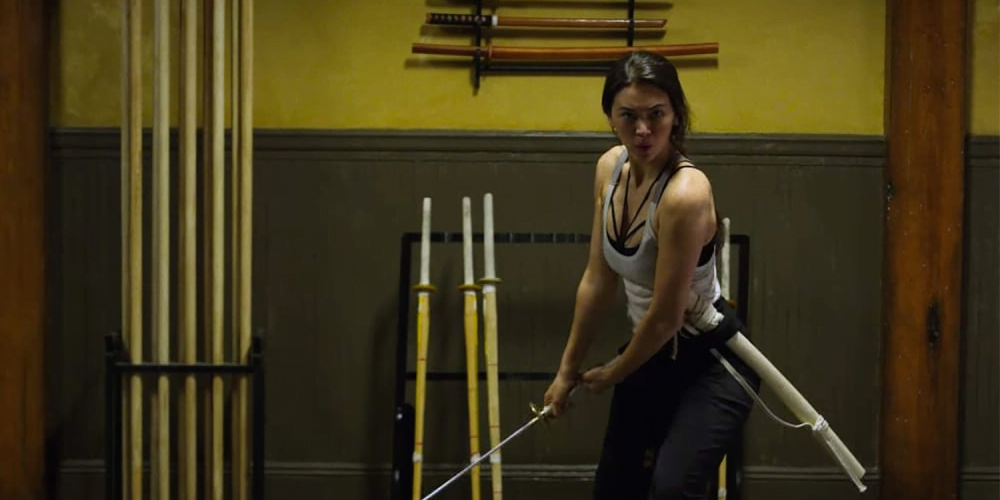
This story wants to juxtapose one culture it doesn’t really seem to understand or respect with a culture it invented. They chose to compare K’un-L’un’s ideals with Coleen’s and then present K’un-L’un as superior. It could have been a non-confrontational relationship; they could have spoken of old teachers together, of connecting to mysterious masters that don’t exist because of Coleen’s association with the Hand. Instead, they made this choice.
And again, K’un-Lun doesn’t exist.
That Time Danny Punched A Pliable Woman In The Face
This example’s been discussed elsewhere but let’s talk about Season 1, Episode 6; Immortal Emerges From Cave. It’s a tournament episode (that’s not a tournament, because Danny just has to fight everyone). That’s where we meet the Bride Of Nine Spiders.
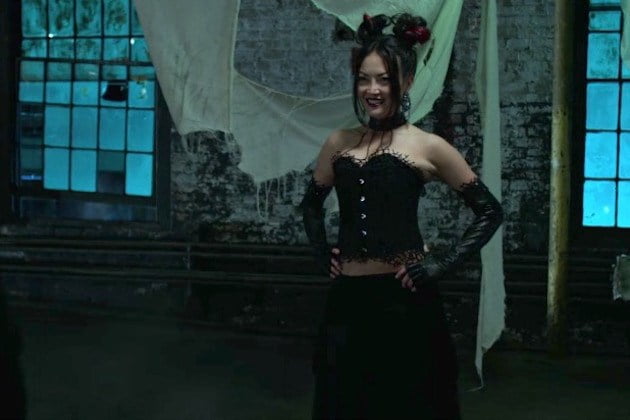
Remember our Daredevil conversation? Here’s the short list of signals that a character isn’t a character but is instead an object.
- Instrumentality: Does this character exist to explain something about the story?
- Agency: Does the character have the capacity to make choices for themself?
- Ownership: Is this character owned by someone else? Do they exist without that character?
- Fungibility: Is the character interchangeable with other such characters?
- Violability: Can you visit violence on this character without moral question?
- Subjectivity: Does the character have a subjective perspective? Their own views, their own desires or values?
The character is not fungible – she’s got a standout design that contrasts with the rest of the Hand. Also, she’s a woman while they’re mostly represented by men. You can maybe read something into her introductory shot suggesting she’s a poison researcher… but you’d have to do a lot of work to claim that’s subjectivity or violability. Beyond that? She gets the whole list. Note that there’s nothing wrong with having a character be an object in your story, objects are useful tools to move things along. There sure is a problem with, for example, having a lot of characters who are just objects, especially if all those characters share a racial grouping.
The Sexually Dangerous Exoticised Woman is a trope so old it’s literally gathering dust, and she’s an Exotically Sexy Acupuncture Spider Lady, which is …Not A Good Look. I’m not against spiders, or sexiness, or associating spiders with sexiness; No, the concern is that The Bride of Nine Spiders isn’t presented as anything but that. There is no question of why she does things, or how she does things. She simply is.
For instrumentality, she does a bunch of stuff that makes no sense when considered as her actions to achieve her ends, and once she fills her role in the story she’s gone. Hypothetically her purpose is to defeat the Iron Fist. What we see is a sequence where she enables and explains things about Danny to the audience, things that the story has not shown to the audience. Somehow, we’re told, the Bride of Nine Spiders knows what Danny really wants, what he really is.
How is she supposed to know?
Why does she try seducing him after poisoning him? Why does she put herself in unnecessary danger? If she can close with him and pin him, why not just poison him more? If she had her own identity, her own personality, you could use that as your reason, but the scene doesn’t do anything to do that. The Bride of Nine Spiders is a tool Iron Fist uses to fill time in the story, to state some things about Danny, and then she needs to be dealt with so the story can proceed.
That’s why we get a full shot of Danny backhanding a pretty Asian lady who’s pressing up against him. It literally takes a beat to show us, oh hey look at Danny punching this woman who was flirting with him in the face.
Now remember: This is not a scene from the comics. This isn’t something in the actress’ contract. This is something they chose to show.
Why.
Who failed to think about this scene twice?
Part 4: Doing Poorly Poorly
Iron Fist Week Part 2: The Whiteness Of Danny Rand
Why’s Danny white?
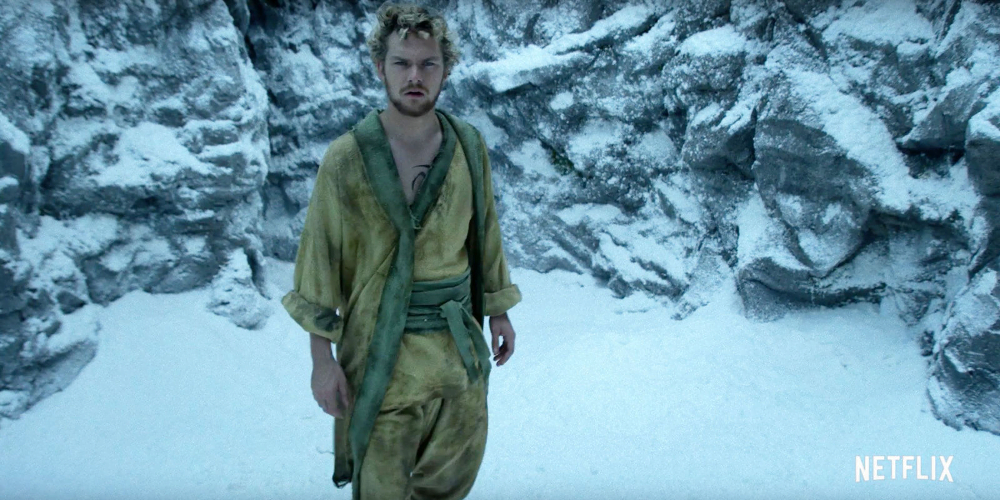
We talked about how the truth of the comics is nonsense – they threw out everything in the comics that matters to the origin and structure of Danny. They didn’t even tell a superhero story with him. They made a Daredevil knockoff, complete with giving Danny one of Daredevil’s villains to oppose.
Why then, is he white? The answer lies at the bottom of this post, but before we go there, a fold, and a conversation about what Danny should have been, in my opinion.
Continue Reading →Iron Fist Week Part 1: True To The Comics
“Happy families are all alike; every unhappy family is unhappy in its own way.”
— Leo Tolstoy
While I’ve had things to say about Daredevil and Luke Cage, those works were largely mixed, fairly robust and reasonably whole things, things that worked. They were series that were not great, but were good enough and were mostly remarkable in the ways they could be better. They were, as it were, happy families: they were similar. Even outlining their failures was mostly best left to small, short summaries.
Iron Fist, however, is an unhappy family, and it is unhappy indeed.
Rather than try and hammer together every complaint there is about Iron Fist into one mega-essay, which, let’s not kid ourselves, it’d be a rant, lose focus, and it’d need to be a dozen things all at once. Instead, then:
WELCOME TO IRON FIST WEEK!
Oh and I’m gunna spoil the heck out of stuff.
Continue Reading →